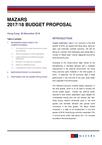
INTRODUCTION
Despite stabilization signs in our economy in the third quarter of 2016, we expect that Hong Kong, being an open and externally oriented economy, will still be facing an uncertain and challenging year ahead after a number of “Black Swan” events happened around the world during the year.
According to the Government’s data, thanks to the strengthening in domestic demand and a moderate improvement in the external environment, the Hong Kong economy grew modestly in the third quarter of 2016. In particular, the US economy, after a weak performance in the first half of the year, grew faster than expected in the third quarter.
The Mainland economy showed steady expansion in the third quarter, which is on its track to achieve the annual growth target. Overall, the external sector seemed to have shown stabilization signs despite the uncertainties arising from the US interest rate hike. Hong Kong’s exports continually grew in the third quarter and domestic demand also gained some momentum in the third quarter. The labour market remained in a state of full employment. In the third quarter of 2016, Hong Kong’s economy expanded 1.9% in annual terms, which was above the 1.7% increase recorded in the second quarter.
Over the past years, Mazars has been submitting budget proposals to the Financial Secretary with particular emphasis on measures in enhancing Hong Kong’s tax competitiveness. In 2016, the Inland Revenue (Amendment) (No. 2) Ordinance 2016 has been enacted which allows, under specified conditions, the deduction of interest payable on money borrowed by a corporation carrying on in Hong Kong an intra-group financing business and also provides for a concessionary profits tax rate at 8.25 per cent for qualifying corporate treasury centres. We welcome the new legislation and believe that it provides a conducive environment for attracting multinational and Mainland corporations to centralise their treasury functions in Hong Kong, and thereby enhancing the competitiveness of our financial markets and contributing to the development of a headquarters economy.
Furthermore, we welcome the enactment of the Inland Revenue (Amendment) (No. 3) Ordinance which provides a legal framework in Hong Kong for implementing automatic exchange of financial account information in tax matters. The new legislation enables Hong Kong to deliver its pledge of support for the new international standard on automatic exchange of financial account information in tax matters as promulgated by the Organisation for Economic Cooperation and Development. This is important for Hong Kong to comply with the international standard and maintain our reputation as an international financial centre and a responsible member of the international community.
Being one of the major accounting firms in Hong Kong, we will keep contributing our thoughts to the Government on tax policy formulation with an aim to enhance Hong Kong tax competitiveness. In this budget proposal, our recommendations cover three areas that aim to:
• enhancing Hong Kong’s tax competitiveness;
• improving Hong Kong people’s livelihood; and
• preparing for an ageing population.


